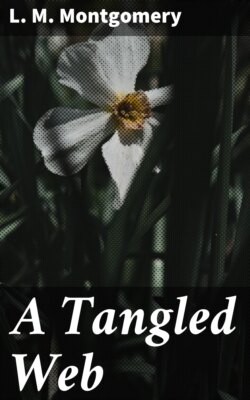Читать книгу A Tangled Web - L. M. Montgomery - Страница 5
На сайте Литреса книга снята с продажи.
3
ОглавлениеTable of Contents
While Ambrosine Winkworth has gone for the jug and a hush of excitement and suspense has fallen over the assembled clan, let us look at them a little more closely, partly through Aunt Becky’s eyes and partly through our own, and get better acquainted with them, especially with those whose lives were to be more or less affected and altered by the jug. There were all kinds of people there with their family secrets and their personal secrets, their outer lives of which everything—nearly—was known, and their inner lives of which nothing was known—not even to lean, lank Mercy Penhallow, whose lankness and leanness were attributed to the chronic curiosity about every one which gave her no rest day or night. Most of them looked like the dull, sedate folks they were but some of them had had shocking adventures. Some of them were very beautiful; some were very funny; some were clever; some were mean; some were happy; some were not; some were liked by everybody and some were liked by nobody; some had reached the stodgy plane where nothing more was to be expected from life; and some were still adventurous and expectant, cherishing secret, unsatisfied dreams.
Margaret Penhallow, for instance—dreamy, poetical Margaret Penhallow, who was the clan dressmaker and lived with her brother, Denzil Penhallow, in Bay Silver. Always overworked and snubbed and patronised. She spent her life making pretty clothes for other people and never had any for herself. Yet she took an artist’s pride in her work and something in her starved soul sprang into sudden transforming bloom when a pretty girl floated into church in a gown of her making. She had a part in creating that beauty. That slim vision of loveliness owed something of its loveliness to her, “old Margaret Penhallow.”
Margaret loved beauty; and there was so little of it in her life. She had no beauty herself, save in her overlarge, strangely lustrous eyes, and her slender hands—the beautiful hands of an old portrait. Yet there was a certain attractiveness about her that had not been dependent on youth and had not left her with the years. Stanton Grundy, looking at her, was thinking that she was more ladylike than any other woman of her age in the room and that, if he were looking for a second wife—which, thank God, he wasn’t—Margaret would be the one he’d pick.
Margaret would have been a little fluttered had she known he was thinking even this much. The truth was, though Margaret would have died any horrible death you could devise before she admitted it, she longed to be married. If you were married you were somebody. If not, you were nobody. In the Dark and Penhallow clan, anyhow.
She wanted a dear little homey place to call her own; and she wanted to adopt a baby. She knew the very kind of baby she wanted—a baby with golden hair and great blue eyes, dimples and creases and adorable chubby knees. And sweet sleepy little kisses. Margaret’s bones seemed to melt in her body as water when she thought of it. Margaret had never cared for the pack of young demons Denzil called his family. They were saucy and unattractive youngsters who made fun of her. All her love was centred in her imaginary baby and her imaginary little house—which was not quite as imaginary as the baby, if truth were known. Yet she had no real hope of ever owning the house, while, if she could get married, she might be able to adopt a baby.
Margaret also wanted very much to get the Dark jug. She wanted it for the sake of that far-off unknown Harriet Dark concerning whom she had always had a strange feeling, half pity, half envy. Harriet Dark had been loved; the jug was the visible and tangible proof of that, outlasting the love by a hundred years. And what if her lover had been drowned! At least, she had had a lover.
Besides, the jug would give her a certain importance. She had never been of any importance to any one. She was only “old Margaret Penhallow,” with fifty drab, snubbed years behind her and nothing ahead of her but drab snubbed old age. And why should she not have the jug? She was a real niece. A Penhallow, to be sure, but her mother had been a Dark. Of course Aunt Becky didn’t like her, but then whom did Aunt Becky like? Margaret felt that she ought to have the jug—must have the jug. Momentarily, she hated every other claimant in the room. She knew if she had the jug she could make Mrs. Denzil give her a room to herself in return for the concession of allowing the jug to be put on the parlour mantelpiece. A room to herself! It sounded heavenly. She knew she could never have her little dream-house or her blue-eyed, golden baby, but surely she might have a room to herself—a room where Gladys Penhallow and her shrieking chums could never come—girls who thought there was no fun in having a beau unless you could tell the world all about him and what he did and what he said—girls who always made her feel old and silly and dowdy. Margaret sighed and looked at the great sheaf of mauve and yellow iris Mrs. William Y. had brought up for Aunt Becky, who had never cared for flowers. If their delicate, exotic beauty was wasted on Aunt Becky, it was not lost on Margaret. While she gazed at them she was happy. There was a neglected clump of mauve iris in the garden of “her” house.
